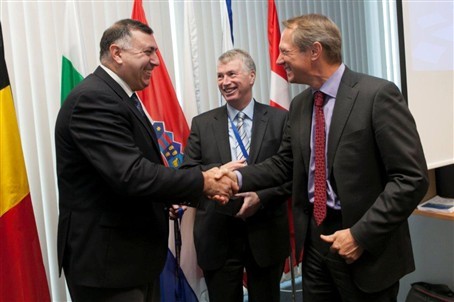The Fusion for Energy family gains a new member


Fusion for Energy (F4E) welcomed a new addition to the family. Following its accession to the European Union on 1 July 2013, Croatia attended this week’s meeting of F4E’s Governing Board for the first time. Joining the existing 27 EU Member States, Switzerland and the European Commission, Croatia becomes the 30th member of F4E. “We are very pleased that Croatia is being represented at the Governing Board and that Croatian industry and research organisations are already expressing interest in working with F4E” said Mr Stuart Ward, Chair of F4E’s Governing Board.
Professor Henrik Bindslev, who has served as F4E’s Director since January 2013, informed the Governing Board about progress with the construction of the international ITER fusion energy project, for which Europe is the largest contributor. “We are making steady progress and establishing close partnerships with industries from all corners of Europe to make ITER a reality”, said Professor Bindslev. He added that “We started pouring concrete at the beginning of December for the foundations of the building which will house the ITER fusion device – this is another important milestone”. “We have also made excellent progress with the fabrication of the superconducting magnets” he added.
Among the most important decisions taken this week, the Governing Board adopted F4E’s work programme for 2014 and the associated budget of almost EUR 900 million, the vast majority of which will be used to finance contracts and grants with European industry and research organisations related to the construction of ITER. Mindful of the importance of staying within the overall European budget for ITER construction, the Governing Board approved reductions in areas of F4E’s longer-term programme that do not directly impact on its international obligations towards the ITER project.
The Governing Board also approved a number of amendments to the founding statutes of F4E. In addition to the assignment of voting rights to Croatia, the amendments will optimise the responsibilities of the committees that supervise F4E and allow for more durable, long-term partnerships with European fusion research laboratories who have, thanks to the European fusion programme, built up much of the expertise needed to make ITER a success.
Finally, the Governing Board welcomed the progress being made by F4E to reinforce its partnerships with industry and European fusion research laboratories. Professor Bindslev noted that “We have been listening attentively to industry and I am confident that we have made a number of improvements that will ensure that working on ITER with F4E does not only present exciting scientific and technical challenges but also attractive commercial opportunities”.
The summary of decisions and output documents from the Governing Board meeting are accessible here.
Background
The Governing Board is responsible for the supervision of F4E in the implementation of its activities. It makes recommendations and takes decisions on a wide range of matters, such as adopting the financial regulation and its implementing rules, adopting the annual work programmes and budgets, approving the annual accounts and annual activity reports, as well as adopting rules on industrial policy, intellectual property rights and the dissemination of information in agreement with the European Commission. Each member of F4E is represented in the Governing Board by two representatives, one of which has scientific or technical expertise in the areas related to its activities. For further information, consult our webpage.